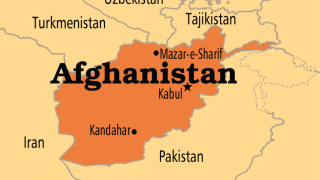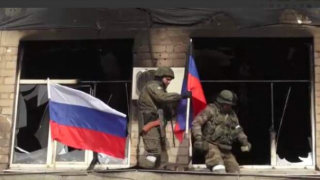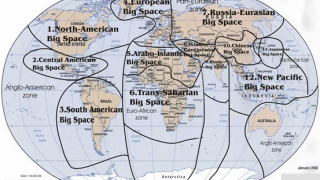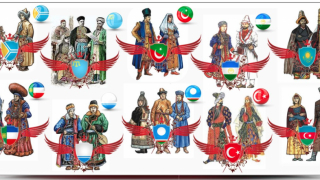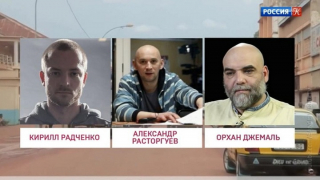From the Archeo-modernity to the Empire
In Russia, we live under the conditions of archaeomodernity. The second edition of my book Archaeomodernism has just been published, in which I describe this phenomenon in detail.
Its essence is that in the same society there is a two-tiered pattern of interpretation of almost all phenomena and principles, in politics, culture, everyday life, etc. The core of the population remains rather archaic and continues to live in the conditions of traditional society, while officially the state is modern, essentially westernised. Thus our constitution, the organisation of political life and the ruling stratum represent modern, rather liberal Western European systems; but all this functions very differently from the countries of the modern West, because it is reinterpreted in its own way by the archaic society.
This creates the Archaeo-modern, a system in which on the outside everything is quite modernist, but on the inside it is deeply archaic.
This is most noticeable in the attitude towards ultimate power: European modernity, at least since Montesquieu and even earlier in England, has long since stripped power of any hint of sacredness. The separation of powers and the constant rotation of the ruling class serve precisely this purpose, dispersing the ultimate decision-making centre in different and regularly changing governing bodies. Of course, such democracy has not achieved its goals in the West itself, stopping the dispersion of power at the level of the oligarchic class, within which there is a rotation that occasionally includes 'new blood' - but only those who are willing to play by the rules of the existing elite. However, in Russia oligarchy always proves unstable and gives way to authoritarianism and autocracy in one form or another, and this is not so much due to the usurpation of supreme power by a single individual, but to the needs of society itself, which at its core remains patriarchal, traditional and sees in the supreme ruler a fatherly, almost mystical figure. Until 1917, this sacralisation was based on the theory of the catechumens, the Holders, borrowed from the Byzantine Empire and transferred to Russia (Moscow - the Third Rome) at the end of the 15th century, but even after 1917, this tradition, after being modified, did not disappear but was extended to the new communist rulers - the 'red monarchs' - which led to an almost 'religious' cult of Lenin and the glorification of Stalin's personality.
For all his weakness and dependence on the oligarchs, even Yeltsin was a kind of 'liberal tsar', but with the arrival of Putin and his truly decisive patriotic reforms - and, we note, completely against his will - the autocratic principle unfolded in all its force. The people only want Putin and no one else, and they are ready to change the constitution and everything else to get him. Putin is the supreme ruler, the saviour of Russia, as he is perceived by the archaic core. And this extends to the SMO, which is justified precisely at the level of the people (while at the level of the elite it clearly provokes rejection and at least bewilderment).
The archaic core remains monarchical and, above all, it is a monarchism from below. The ruling class - that same state that Pushkin called 'the only European in Russia' - tries to give a formal and outwardly modern democracy real substance (in reality, to establish an oligarchy subservient to the globalist world power of the liberal elites), but is repeatedly defeated.
However, the Westernist and modernist façade does not change, nor does it conform to the will of the archaic and deeply conservative core. It remains unchanged and the 'European-only' elite, the Russian oligarch-Western collective, does everything to maintain this external 'modernity', hoping that in the future, under a weak ruler or during some cataclysmic event, it will still be able to permanently crush the Russian-Eurasian identity. The Russian Federation itself, which emerged in 1991 from the ruins of Great Russia (USSR, Russian Empire), was founded as an instrument of decisive modernisation and globalisation. At the cost of real torture and savage violence against the people, not only physically but also spiritually, against their deepest self-consciousness, which has remained largely unchanged.
Archaeo-modernism is an illness, a kind of social schizophrenia. The same society is aware of itself in diametrically opposed ways. From outside and above it is a modern liberal Western-style democracy, from below and within it is a world power with the will to rebuild an empire, with a sacred supreme ruler at its head, with traditional values and a conservative psychology that rejects 'progressive' Western attitudes (LGBT+, ultra-feminism, etc.) as perverse.
All this generates a conflict of interpretations (as Ricoeur puts it). Hence the total lie. Everyone lies, about everything. Both those in power and those not in power have to deal with an unstable and painfully distorted mentality that deliberately contains an immovable contradiction. At the same time, there is no attempt to reconcile the modern and the archaic. It is true that liberal elites occasionally try to attack the archaic core, but they are thwarted by the supreme power, which stands above the elites and is based on the archaic-monarchic will of the people. And the whole system of archaeo-modernity stagnates again.
From the elites' point of view, the solution to the archaeo-modern problem can only lie in 'modernisation', 'progress' and the integration of Russia into the global West. But it is interesting to note that the archaeo-modernist sometimes also breaks with elite Western modernisers. The case of former president and former prime minister of the Russian Federation Dmitry Medvedev is illustrative. In his high office he remained a staunch Western liberal, relied on globalist advisors, proclaimed modernisation and democratisation, cautiously sought a return to the 1990s, and received the support of American globalists, Biden himself and the Atlanticist Brzezinski, who actively lobbied for his 'second term'. Now he tirelessly scribbles ultra-patriotic and hyper-imperialist posts on social networks, which the regime at the top is even forced to censor. The elites wonder: 'the account must have been hacked'. No, it's nothing personal, it's just arch-modern.
Of course political calculations and strategies cannot be ruled out, but even this only confirms the diagnosis: you want to be the supreme ruler in Russia, you appeal to the archaic core of the people, to strong power and social justice. It's that or nothing. The theorem of archaeomodernity is proven.
However, another scenario must also be considered, which, alas, does not even exist in theory yet. All proposed (consciously proposed) solutions to the archaeo-modernity impasse boil down to modernisation or cynical exploitation of this mental tragedy, a people condemned to a false identity.
However, there is another way out: shouldn't the Western-modernist liberal elites subordinate the people, the archaic? Should we not recognise autocracy, patriarchy and the authoritarian system not only de facto, but also de jure? Shouldn't the Church and the institutions of traditional society regain their dominant position in society (with a full revival of traditionalist tendencies and a definitive liberation from ecclesiastical liberalism - Laric, bye-bye, how is Budapest)? Could not a large-scale conservative revolution in epistemology - science, education, enlightenment - be implemented? Shouldn't the elites be called upon to be loyal to the people, rather than to abstract globalist principles? Shouldn't we strike at the weakened but still influential oligarchy?
This is also a solution that many politicians in both Tsarist and Soviet Russia were leaning towards. At first it was the Slavophiles, the Russian religious philosophers, the Silver Age geniuses. They also saw archaeo-modernism in the Russia of the Romanovs (at least from Peter onwards) and justified the need for a return to Moscow's sacred way of life and the origins of the people.
In Soviet times, this line was defended by the National Bolsheviks (Ustryalov, Lezhnev) and developed in emigration by the Eurasians. It was proposed to cure Soviet arch-modernity by appealing to the Russian element.
This scenario, therefore, has a solid history in the national cultural tradition. Numerous representatives of the elite moved in their time to the side of the people, but not westernised and oligarchic, but spiritual and majestic, deeply patriotic.
Only such a conservatism, or rather, a conservatism-revolutionary (mere conservatism is not enough) will guarantee us victory in the SMO. Archaeo-modernism must be overcome, and it is in the direction of a full restoration of the sacred order, of the people and of power at the same time.
Translation by Lorenzo Maria Pacini



